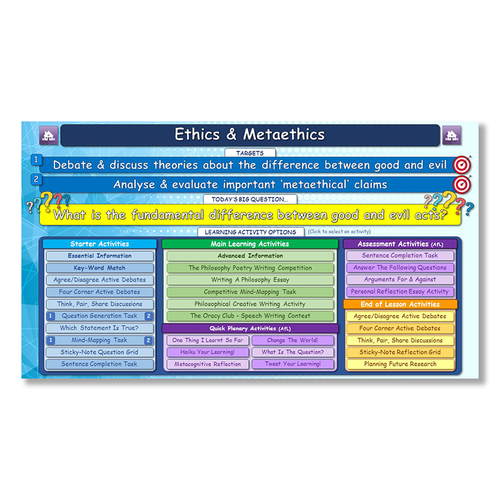














This thought-provoking philosophy teaching resource focuses on ethics and meta-ethics: instead of focusing on specific moral issues (which is covered in a different session on ‘Applied Ethics’ this re-usable lesson explores the fundamental nature of ethics, the difference between ‘right’ and ‘wrong’, the function of moral language, different theories of normative ethics, different ways of thinking about how we ought to live, and deeper issues around the metaphysical status of good and evil.
This session is ideal for teachers who want to explore philosophy with students and is of particular value to teachers who want to nurture the moral development of their students (perhaps in an SMSC or PSHE context) and trigger deeper reflections on the fundamental nature of ‘right and wrong’; we’ve carefully selected the most significant issues and questions relating to normative ethics and meta-ethics so that young learners can engage in fun philosophical discussions and debates. This session explores topics such as:
- The fundamental nature of good and evil
- Different ways of evaluating the morality of actions
- Virtue ethics and what it means ‘to be a good person’
- Whether or not morality is absolute or relative (e.g. to different cultures and time-periods)
- The degree to which moral judgements refer to objective facts
- The degree to which moral judgements are baseless and arbitrary
The big question asked in this session is “What is the fundamental difference between good and evil acts?”. Using a variety of engaging activities students will discuss and debate a wide range of other philosophical questions such as:
- What makes it reasonable to call a specific action “good”?
- Are there some actions that we can say are always evil in all situations, time periods and cultures?
- What is the role of empathy in compassion in determining the most morally correct course of action in life? and
- What is the most important virtue to cultivate in life?
Students will also analyse and evaluate an eclectic mix of philosophical claims such as:
- “Some actions are morally permissible even when they create suffering for others.”
- “Some people are born evil” and
- “It is impossible to truly know the difference between right and wrong, good and evil.”
This resource is suitable for teachers of all school subjects who are looking to introduce philosophy, philosophical thinking and critical thinking. The file is a PowerPoint Show: no planning or preparation is required, just run the file and the intuitive menu system will make delivering a powerful philosophy session very easy!
Something went wrong, please try again later.
This resource hasn't been reviewed yet
To ensure quality for our reviews, only customers who have purchased this resource can review it
Report this resourceto let us know if it violates our terms and conditions.
Our customer service team will review your report and will be in touch.